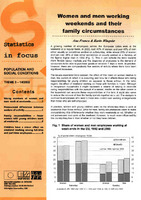| dc.contributor.author | Winqvist, Karin |
| dc.contributor.author | Franco, Ana |
| dc.date.accessioned | 2020-09-28T05:48:11Z |
| dc.date.available | 2020-09-28T05:48:11Z |
| dc.date.issued | 2002 |
| dc.identifier.issn | 1024-4352 |
| dc.identifier.uri | https://ketlib.lib.unipi.gr/xmlui/handle/ket/2854 |
| dc.description | Downloaded from EU Bookshop. |
| dc.description | http://aei.pitt.edu/id/eprint/85263 |
| dc.description.abstract | A growing number of employees across the European Union work at the weekend on a regular basis. In 2000, over 40% of women and over 45% of men either usually or sometimes worked on a Saturday, while almost 23% of women and just over 26% of men either sometimes or usually worked on a Sunday, all the figures higher than in 1992 (Fig. 1). This in part reflects the trend towards more flexible labour markets and the response of producers to the demand of consumers to be able to purchase goods or services 7 days a week. In practice, however, there are comparatively few sectors of activity where there have been significant increases. |
| dc.format.extent | 8p. |
| dc.language.iso | en |
| dc.publisher | Statistical Office of the European Communities and Social Statistics |
| dc.subject | Household expenditure |
| dc.subject | Family social security |
| dc.subject | Family Budgets |
| dc.title | Statistics in Focus: Population and social conditions. Women and men working weekends and their family circumstances. |
| dc.type | working document |
| dc.publisher.place | Brussels |

